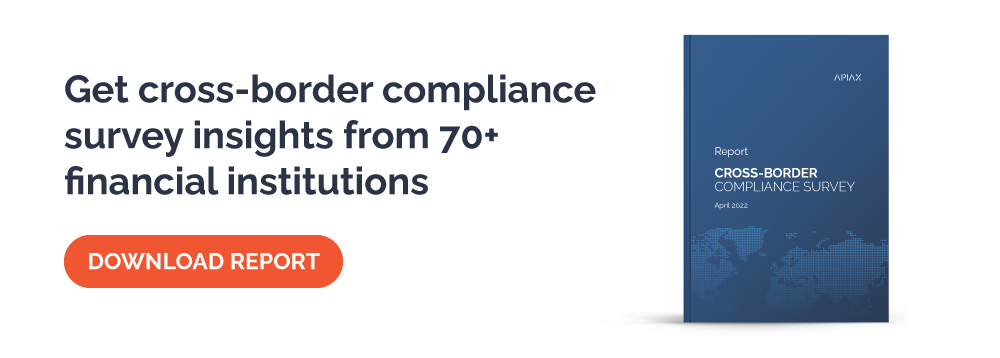
Global mobility is generally a hallmark of our times, but especially so for wealth managers and private banks. Borders are fluid for assets and their owners, creating huge opportunities to conduct business on a truly global basis.
The challenge then is that the more countries a firm offers products and services in, the more regulatory regimes it has to contend with. Any institution with international ambitions, as most surely do, finds itself caught in a web of intersecting, constantly evolving rules and facing an ongoing struggle to extricate itself from confusion if it is to both maximise business opportunities and minimise compliance risks.
Our annual Cross-Border Compliance Survey digs deep into the challenges institutions face and which they need solutions for, and seeks to uncover the gap between what current practices generally are and what the leaders are doing to turn this notorious pain point (and its interlinked costs) into a competitive advantage through the application of new technologies. The widening chasm between the “old school” and the new is plain for us to see, but we want to provide the sector with a year-by-year tracking of developments (and what we are also told is an invaluable peer benchmarking tool).
The first thing which is abundantly clear is that cross-border complexity continues to grow for the majority of firms: today, 61% of our survey respondents’ institutions serve clients in 20 or more countries (up from 51% in 2021). What is more, operating ever more globally is increasingly a strategic choice, rather than a necessity thrust upon them to keep existing clients happy. Just last year, only 3% of survey respondents said their institution was actively offering products and services in multiple countries (as opposed to only passive offerings, in response to client requests). That proportion now stands at 24%.

Growth-hungry institutions may be well convinced by the business case for cross-border banking and asset management, yet they are also acutely aware of the full range of regulatory compliance complications that come alongside. When asked this question, our survey participants voted in largely similar proportions for offering investment advisory solutions, offering securities or bank accounts, social contacts with clients, disseminating independent investment research and funds distribution.
New to our 2022 survey is a comparison between how front office and legal and compliance personnel experience cross-border frameworks in their day-to-day work. The difficulty of effectively conveying cross-border compliance requirements to client-facing staff continues to be far and away the biggest pain point firms are experiencing (as voted for by 45% of respondents), but what is really instructive here is the stark disconnect between back-office and front-office perceptions which emerged.
We see, for instance, that 52% of legal and compliance staff say that they disseminate knowledge through online documents like policies and manuals, and only 14% answer compliance questions via email or phone. However, 75% of front-office staff say the only way to obtain the information they need on cross-border regulations is to get in touch with their compliance team or external consultant, with only 25% sourcing the facts through their company intranet. This strongly suggests that not only does accessing compliance information remain a highly manual process, but also that old-style self-service models generally don’t seem to be working as institutions would hope.
The problem is that while picking up the phone or dashing off an email might seem like a quick and easy solution to the individual advisor, the volume of enquiries soon mounts up to create a heavy burden for legal and compliance teams. We found that 38% of respondents whose job it is to provide information on cross-border rules get more than 20 such requests from their client-facing colleagues on average per month. With 52% saying each takes up to 30 minutes to resolve, 14% needing an hour and 5% even more, we can see how easily a manual approach just eats up time.
There is a growing consciousness that cross-border rules (and compliance generally) represent low-hanging fruit for efficiency gains and cost reduction. And here again, respondents see the potential across a wide range of activities. Although investment proposals, pre-trade order execution and distribution of research led to the activities which would most benefit from automated digital checks of cross-border rules, everything from marketing and meetings, to service plans and travel, had a strong showing too. Whichever pain point primarily drives a shift to digital, we can be sure every department touched by cross-border rules will swiftly see the benefits.
We have been able to publicise the fact, for instance, that a Big Four consultancy’s report on an Apiax implementation confirmed a 90% reduction in compliance support and we’d like to see our 2022 survey findings as evidence that word is filtering out about the manifold and manifest benefits of digitised compliance rules. That we’ve seen a fourfold increase in firms obtaining regulatory knowledge in digital format in just one year and that 38% of respondents say their firm’s priority for the year ahead is to fully embed cross-border restrictions into their existing processes and tools would certainly suggest this is the case. Indeed, the shift to digitised compliance is happening so rapidly right across the sector, we’re already looking forward intently to what 2023’s survey will show.
The sector is digitising at a frenetic pace across every element of operations and, while compliance might have got off to a slower start, our 2022 Cross-Border Compliance Survey confirms a blistering rate of change is afoot – or at least for institutions which are determined to turn compliance challenges into a source of competitive advantage.
As our research shows, this cohort is growing rapidly year on year as the full range of benefits that can come from embedding digitised regulatory rules get better known. And, while the efficiency savings are potentially very great, they are certainly broader and more strategic in nature than just that.

